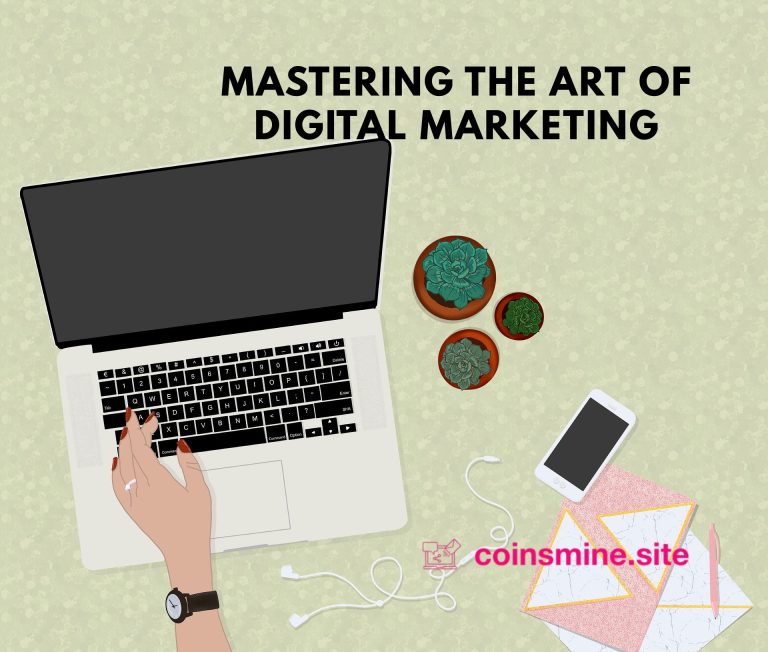Mastering the Art of Digital Marketing: In the current digital era, companies can no longer depend exclusively on conventional marketing techniques to engage their audience. Digital marketing has become crucial for establishing brand recognition, attracting potential customers, and increasing sales. With a multitude of tools, platforms, and strategies at their disposal, excelling in this field necessitates more than just a fundamental grasp—it requires a deliberate, data-informed strategy.
Digital marketing provides impactful methods for engaging with consumers, encompassing SEO, content marketing, social media, and paid advertising. In this article, we will delve into the essential elements, strategies, and emerging trends that will enable you to succeed in the constantly evolving digital environment.
Mastering the Art of Digital Marketing
In our rapidly moving, interconnected environment, digital marketing has emerged as the foundation of success for businesses. Whether it’s a small startup or a large corporation, every brand needs to build a robust online presence to remain relevant, competitive, and profitable. Excelling in digital marketing goes beyond just knowing the platforms—it’s about developing a strategy that resonates with the appropriate audience at the optimal time, conveying the right message.
What Is Digital Marketing?
Digital marketing encompasses all types of marketing that take place on the internet. This covers platforms such as search engines, websites, social media, email, mobile applications, and online ads. In contrast to conventional marketing, digital marketing enables brands to engage directly with their audience and monitor results in real-time.
The main objective of digital marketing is to create leads, increase brand recognition, and turn potential customers into devoted clients.
Core Components of Digital Marketing.
To master digital marketing, it’s essential to understand its key components:
(1) Search Engine Optimization (SEO).
SEO involves enhancing your website and content to achieve better rankings on search engine results pages (SERPs). A properly executed SEO strategy boosts organic traffic and enhances visibility, simplifying the process for potential customers to discover you.
(2) Content Marketing.
At the core of digital marketing lies valuable, high-quality content. This can include blog articles, videos, infographics, or podcasts, all of which contribute to establishing trust, educating audiences, and enhancing engagement.
(3) Social Media Marketing.
Social networks such as Facebook, Instagram, LinkedIn, and TikTok provide effective methods to reach your audience. Regular posting, interacting with followers, and implementing targeted advertisements can enhance your brand’s message.
(4) Email Marketing.
Customized and automated email campaigns can cultivate leads, enhance conversions, and maintain customer loyalty over time.
(5) Pay-Per-Click (PPC) Advertising.
PPC consists of purchasing ad space on platforms such as Google Ads or Meta Ads. It’s an effective method to quickly generate traffic and conversions, particularly when paired with an optimized landing page and focused keywords.
(6) Analytics and Data.
Resources such as Google Analytics, Meta Business Suite, and SEMrush assist marketers in comprehending what is effective and what requires modification.
Strategies for Success.
Know Your Audience.
Every effective campaign starts with a deep understanding of your target audience. Who are they? What do they care about, what challenges do they face, and how do they behave online? Creating detailed buyer personas allows you to customize your messaging and select the right channels more effectively.
Set Clear Goals.
Are you looking to create leads, enhance sales, or raise brand awareness? Establishing SMART objectives (Specific, Measurable, Achievable, Relevant, and Time-bound) helps keep your initiatives focused and quantifiable.
Be Consistent Across Channels.
Your audience may engage with your brand on various platforms. Ensure consistency in your messaging, tone, and visual identity across all digital platforms to build trust and recognition.
Stay Updated.
The landscape of digital marketing shifts quickly. From modifications in search algorithms to fresh social media functionalities and innovative technologies like AI, keeping up-to-date is crucial for preserving your competitive advantage.
The Importance of Adaptability.
What is effective today may not be effective tomorrow. Changes in consumer behavior, technology, and platforms can happen rapidly. The most successful digital marketers are those who remain flexible, conduct frequent tests, and welcome change as an integral aspect of the process.
Conclusion.
Becoming proficient in digital marketing is a lifelong process rather than a single accomplishment. By grasping the essential elements and committing to ongoing learning and adaptation, companies can establish robust digital frameworks that promote growth and foster customer loyalty over the long run.
Regardless of whether you’re beginning or enhancing your approach, keep in mind that digital marketing involves more than merely having an online presence—it’s about being purposeful, driven by data, and centered on the customer.



